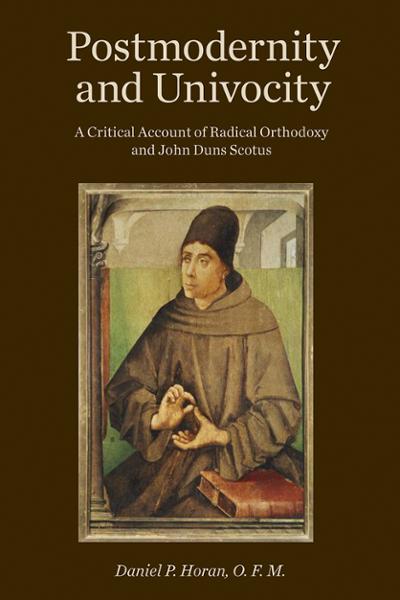Nearly twenty-five years ago, John Milbank inaugurated Radical Orthodoxy, one of the most significant and influential theological movements of the last two decades. In Milbank’s Theology and Social Theory, he constructed a sweeping theological genealogy of the origins of modernity and the emergence of the secular, counterposed by a robust retrieval of traditional orthodoxy as the critical philosophical and theological mode of being in the postmodern world. That genealogy turns upon a critical point—the work of John Duns Scotus as the starting point of modernity and progenitor of a raft of philosophical and theological ills that have prevailed since. Milbank’s account has been disseminated proliferously through Radical Orthodoxy and even beyond and is largely uncontested in contemporary theology.
The present volume conducts a comprehensive examination and critical analysis of Radical Orthodoxy’s use and interpretation of John Duns Scotus. Daniel P. Horan, O.F.M. offers a substantial challenge to the narrative of Radical Orthodoxy’s idiosyncratic take on Scotus and his role in ushering in the philosophical age of the modern. This volume not only corrects the received account of Scotus but opens a constructive way forward toward a positive assessment and appropriation of Scotus’s work for contemporary theology.
The present volume conducts a comprehensive examination and critical analysis of Radical Orthodoxy’s use and interpretation of John Duns Scotus. Daniel P. Horan, O.F.M. offers a substantial challenge to the narrative of Radical Orthodoxy’s idiosyncratic take on Scotus and his role in ushering in the philosophical age of the modern. This volume not only corrects the received account of Scotus but opens a constructive way forward toward a positive assessment and appropriation of Scotus’s work for contemporary theology.
- Publisher Fortress Press
- Format Paperback
- ISBN 9781451465723
- eBook ISBN 9781451469653
- Dimensions 6 x 9
- Pages 144
- Publication Date December 1, 2014
Contents
Contents:
Introduction: The Return to the Narrative
1. Radical Orthodoxy’s Use of John Duns Scotus
2. The Reach of Radical Orthodoxy’s Influence
3. Major Critiques and Analysis of Radical Orthodoxy’s Use of Scotus
4. Toward a Correct Reading of Scotus’s Univocity
Introduction: The Return to the Narrative
1. Radical Orthodoxy’s Use of John Duns Scotus
2. The Reach of Radical Orthodoxy’s Influence
3. Major Critiques and Analysis of Radical Orthodoxy’s Use of Scotus
4. Toward a Correct Reading of Scotus’s Univocity
Endorsements
"Daniel Horan has presented a spirited challenge to Radical Orthodoxy's 'Scotist illiteracy' by identifying the rhetorical sleights of hand of its major voices. Horan clearly inhabits the living tradition of a vital Franciscan theology, long overshadowed by a reactionary overdependence on Thomism in much of contemporary antimodern theology. Postmodernity and Univocity is at once a critical and constructive erudite study, but distinguished by exceptional accessibility and clarity in style."
—Susan Abraham
Loyola Marymount University
"Daniel Horan argues meticulously that Radical Orthodoxy's 'Scotus Story' seriously misunderstands the philosophy of John Duns Scotus. Hence, Scotus cannot be the villain of their story of the rise of secular, idolatrous modernity with its 'space apart from God.' By placing Scotus in the context of his actual debates (with Henry of Ghent more than Thomas Aquinas) and concerns (epistemological and semantic as primary, and metaphysical as derivative), Horan not only effectively undermines the keystone of Radical Orthodoxy’s historical narrative but offers a more persuasive portrayal of Scotus’s central achievements."
—Terrence W. Tilley
Fordham University
"This book provides a careful and fair-minded rebuttal of the presentation of Duns Scotus's thought proposed by the theologians of Radical Orthodoxy. Horan meticulously describes Scotus’s own view and in doing so offers a valuable corrective to the misrepresentations found so frequently in recent literature on the subject."
—Richard Cross
University of Notre Dame
"This is an important book and a long overdue one. Dan Horan has boldly confronted the misreading of Duns Scotus by adherents of Radical Orthodoxy and brilliantly illuminates their metaphysical flaws. At the same time, he shows a correct understanding of univocal being and discusses why Scotus’s metaphysics provides a coherent basis for a postmodern theology. This book can help bridge the relationship between science and religion by providing a correct reading of univocal being, and it can open up new paths of dialogue that have become stifled by theological and philosophical differences."
—Ilia Delio, OSF
Georgetown University
—Susan Abraham
Loyola Marymount University
"Daniel Horan argues meticulously that Radical Orthodoxy's 'Scotus Story' seriously misunderstands the philosophy of John Duns Scotus. Hence, Scotus cannot be the villain of their story of the rise of secular, idolatrous modernity with its 'space apart from God.' By placing Scotus in the context of his actual debates (with Henry of Ghent more than Thomas Aquinas) and concerns (epistemological and semantic as primary, and metaphysical as derivative), Horan not only effectively undermines the keystone of Radical Orthodoxy’s historical narrative but offers a more persuasive portrayal of Scotus’s central achievements."
—Terrence W. Tilley
Fordham University
"This book provides a careful and fair-minded rebuttal of the presentation of Duns Scotus's thought proposed by the theologians of Radical Orthodoxy. Horan meticulously describes Scotus’s own view and in doing so offers a valuable corrective to the misrepresentations found so frequently in recent literature on the subject."
—Richard Cross
University of Notre Dame
"This is an important book and a long overdue one. Dan Horan has boldly confronted the misreading of Duns Scotus by adherents of Radical Orthodoxy and brilliantly illuminates their metaphysical flaws. At the same time, he shows a correct understanding of univocal being and discusses why Scotus’s metaphysics provides a coherent basis for a postmodern theology. This book can help bridge the relationship between science and religion by providing a correct reading of univocal being, and it can open up new paths of dialogue that have become stifled by theological and philosophical differences."
—Ilia Delio, OSF
Georgetown University
Reviews
Review in Anglican Theological Review
